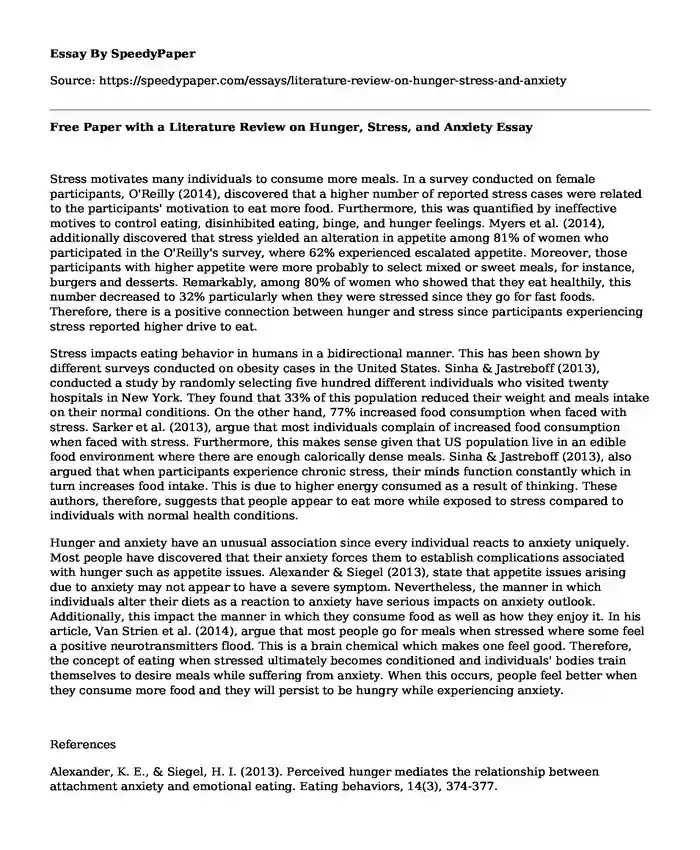
| Type of paper: | Literature review |
| Categories: | Stress Diet Anxiety disorder |
| Pages: | 3 |
| Wordcount: | 629 words |
Stress motivates many individuals to consume more meals. In a survey conducted on female participants, O'Reilly (2014), discovered that a higher number of reported stress cases were related to the participants' motivation to eat more food. Furthermore, this was quantified by ineffective motives to control eating, disinhibited eating, binge, and hunger feelings. Myers et al. (2014), additionally discovered that stress yielded an alteration in appetite among 81% of women who participated in the O'Reilly's survey, where 62% experienced escalated appetite. Moreover, those participants with higher appetite were more probably to select mixed or sweet meals, for instance, burgers and desserts. Remarkably, among 80% of women who showed that they eat healthily, this number decreased to 32% particularly when they were stressed since they go for fast foods. Therefore, there is a positive connection between hunger and stress since participants experiencing stress reported higher drive to eat.
Stress impacts eating behavior in humans in a bidirectional manner. This has been shown by different surveys conducted on obesity cases in the United States. Sinha & Jastreboff (2013), conducted a study by randomly selecting five hundred different individuals who visited twenty hospitals in New York. They found that 33% of this population reduced their weight and meals intake on their normal conditions. On the other hand, 77% increased food consumption when faced with stress. Sarker et al. (2013), argue that most individuals complain of increased food consumption when faced with stress. Furthermore, this makes sense given that US population live in an edible food environment where there are enough calorically dense meals. Sinha & Jastreboff (2013), also argued that when participants experience chronic stress, their minds function constantly which in turn increases food intake. This is due to higher energy consumed as a result of thinking. These authors, therefore, suggests that people appear to eat more while exposed to stress compared to individuals with normal health conditions.
Hunger and anxiety have an unusual association since every individual reacts to anxiety uniquely. Most people have discovered that their anxiety forces them to establish complications associated with hunger such as appetite issues. Alexander & Siegel (2013), state that appetite issues arising due to anxiety may not appear to have a severe symptom. Nevertheless, the manner in which individuals alter their diets as a reaction to anxiety have serious impacts on anxiety outlook. Additionally, this impact the manner in which they consume food as well as how they enjoy it. In his article, Van Strien et al. (2014), argue that most people go for meals when stressed where some feel a positive neurotransmitters flood. This is a brain chemical which makes one feel good. Therefore, the concept of eating when stressed ultimately becomes conditioned and individuals' bodies train themselves to desire meals while suffering from anxiety. When this occurs, people feel better when they consume more food and they will persist to be hungry while experiencing anxiety.
References
Alexander, K. E., & Siegel, H. I. (2013). Perceived hunger mediates the relationship between attachment anxiety and emotional eating. Eating behaviors, 14(3), 374-377.
Myers, R. M., Balsamo, L., Lu, X., Devidas, M., Hunger, S. P., Carroll, W. L., ... & KadanLottick, N. S. (2014). A prospective study of anxiety, depression, and behavioral changes in the first year after a diagnosis of childhood acute lymphoblastic leukemia. Cancer, 120(9), 1417-1425.
O'Reilly, G. A., Cook, L., SpruijtMetz, D., & Black, D. S. (2014). Mindfulnessbased interventions for obesityrelated eating behaviours: a literature review. Obesity reviews, 15(6), 453-461.
Sarker, M. R., Franks, S., & Caffrey, J. (2013). Direction of post-prandial ghrelin response associated with cortisol response, perceived stress and anxiety, and self-reported coping and hunger in obese women. Behavioural brain research, 257, 197-200.
Sinha, R., & Jastreboff, A. M. (2013). Stress as a common risk factor for obesity and addiction. Biological psychiatry, 73(9), 827-835.
Van Strien, T., Ouwens, M. A., Engel, C., & de Weerth, C. (2014). Hunger, inhibitory control and distress-induced emotional eating. Appetite, 79, 124-133.
Cite this page
Free Paper with a Literature Review on Hunger, Stress, and Anxiety. (2022, May 13). Retrieved from https://speedypaper.net/essays/literature-review-on-hunger-stress-and-anxiety
Request Removal
If you are the original author of this essay and no longer wish to have it published on the SpeedyPaper website, please click below to request its removal:
- Essay Example with the Summary of Al-Anon Meeting
- Critical Evaluation Essay Example
- Essay Example on Project Management
- Was the Progressive Era the Second American Revolution?
- Free Essay: Comparison of Personality Theories and Analysis of Your Own Personality
- DNA Analysis Cases Backlog, Free Paper for Students
- Essay on Public Health and Disability: Addressing Challenges, Enhancing Lives
Popular categories




